QuestionQUESTION: We adopted a rabbit today, who'd been found outdoors. He'd been repeatedly seen around the house of the people who took him in, for about 4 days or so. They'd been feeding him carrots, and he kept coming around. Yesterday, they caught him and decided to hang on to him until a suitable home could be found. They live in a small town and put the word out that they had had a rabbit running around their home, posted the news on Facebook, and no one claimed him. We received a call about this rabbit and decided to give the little guy a home, and picked him up today.
For the time being, we are keeping him in his carrier until Tuesday at the very least, which is when we've got an appointment for him to get a check-up and some blood work done (this was the earliest we could get an appointment). We have three other house rabbits and we don't want to risk making them sick. He seems in perfect health, does not appear malnourished or anything. He seems happy enough, quite social with us despite not knowing us yet. My question is, given that he's spent at least a bit of time outdoors, is there any risk he could be sick, or carrying anything that could make our other rabbits sick? Are there any special tests or treatments you would recommend we ask our veterinarian for? When do you think it might be safe to introduce him to our other rabbits and let him hang out in the same space as them (with cages, barriers, working up to supervised dates after he's neutered etc. until they're bonded, of course)?
Also, this is unlikely to be the case, but how can we tell for sure that a rabbit is not wild? He's of a fairly small build, and I'm guessing between 3 to 4 pounds. He's got a greyish-black flecked coat on his body with some white, and his face is black on one side and white on the other, like a Harlequin rabbit. I'm thinking that wild rabbits don't have this type of coloring, and also wouldn't seem so comfortable in the presence of humans. He's well-socialized: he licks our hands and then puts his head underneath them to be groomed in turn.
Thank you very much, in advance, for taking the time to answer. I've encountered your name many places (House Rabbit Society articles, reading answers given on here), and value reading your work. I'm very careful about which sources I turn to for these things - not everyone knows what they're talking about - but when I see your name under an article title, etc. I know I'm getting reliable information. Thanks again!
ANSWER: Dear Kim
Aw. Thanks for the warm fuzzies.
The main thing I'd worry about with a street rabbit is intestinal parasites. We usually treat our incoming strays with Revolution (for mites and fleas, and possibly nematodes) and Panacur (for nematodes).
Coccidial parasites are a possibility, and a fecal flotation will reveal those (as long as the vet is rabbit-savvy, and doesn't mistake common intestinal yeast for coccidia; we've had that happen.). These can be treated effectively with Baycox (toltrazuril) or Marquis (ponazuril).
So I'd recommend a fecal test and general wellness check. But as far as bacterial transmission...I wouldn't worry too much. Bacterial pathogens don't tend to travel readily among rabbits.
Good luck with your new pal! He's certainly a domestic if he's that color and that calm around humans. A cottontail, even if raised by humans, is always going to be very jumpy and not wanting to be touched.
Glad he found a loving home with you!
Dana
---------- FOLLOW-UP ----------
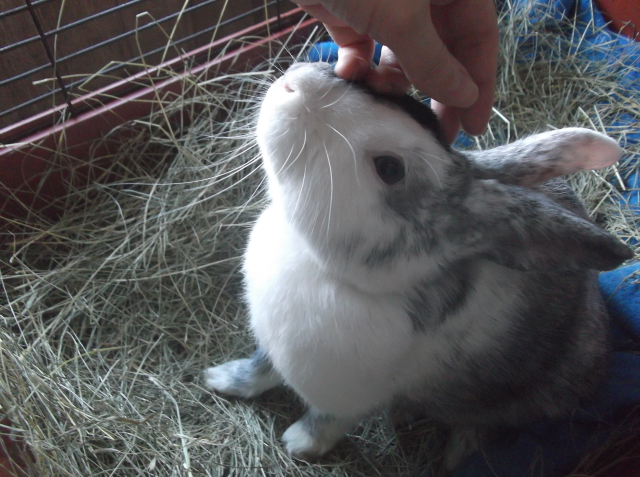 Bunny
Bunny
QUESTION: Hello again.
Thanks again for the prompt answer to my first set of questions. We've taken our new bun to the vet and all his tests were good, with the exception of his protein levels, which were a bit on the low side. His kidney function was also tested and that was normal, so the vet thinks it's likely that he's not gotten much to eat for the week or so (or more) he'd been outside. We've simply been advised to feed him well and we're going to retest in 3 to 6 weeks.
The other factor that might make sense (you tell me) in his protein levels being low might be his age. We suspect he's young. Prior to being castrated, our other house rabbits all exhibited hormonal behavior in the presence of the other rabbits (whether neutered or not): they circled our feet or each other, made honking noises, and tried to mount each other, our feet, etc. They sprayed everywhere, and left immense amounts of fecal pellets everywhere. We let the new guy enjoy running around our place today, and observed no such behavior. He's full of energy. He seemed super interested in the other rabbits fecal pellets (a couple were lying around), but zero spraying nor did he leave any of his own droppings in the room (so far he's doing that only in his litterbox/cage). Does this mean he has yet to reach sexual maturity? His testicles are clearly visible, if that helps, and he's producing cecotropes (if that also helps in identifying his age, the status of his digestive health/maturity, etc.), which he's been eating. He chins his own cage to mark it as his own; haven't noticed him do it with any other objects around the apartment - i.e. he doesn't seem overly concerned with territoriality.
So, I'll finally get to what's concerning me now. Can we be sure this little guy is old enough to be separated from his mother? Will he be fine eating a regular diet of timothy hay, pellets, veggies, and small amounts of fruit? I have both older adult rabbit pellets (timothy-based) and younger rabbit pellets (alfalfa-based), and am thinking that now that we suspect he's younger I'll give him a mix of the two. I'm assuming I'm worrying over nothing (something I do a lot of, haha, especially when it comes to my "kids") but am just wanting to make sure he's likely to be okay. I've added a picture to help in estimating his age.
AnswerDear Kim,
Sorry for the delay! Had an explosion of busy-ness at school because I was helping organize the activities of a distinguished visitor at our university, and it was a bit of a surreal week. 8P
If your bunny's testicles are down, he's *definitely* weaned. And he looks like a young adult. How young/old is nearly impossible to say. But weigh him, measure his body from the nape of the neck to the base of the tail, and check him once a month to see if he's getting longer. When he stops growing, he's about 10-12 months old. Not perfect, but an index at least.
He's very handsome! I'm happy he's found a loving home with you. I wouldn't worry about his lack of marking. Some bunnies are just less territorial and more submissive than others. It bodes well for his eventually being able to get along with the other bunnies in the household.
Good luck with the introductions!
Dana


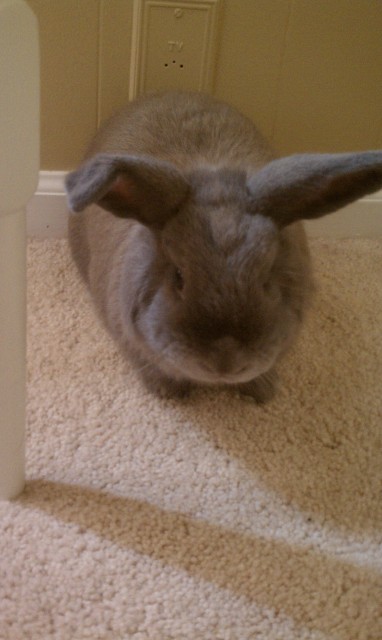 Tip of Rabbits ear going floppy
Question
Winstion
Hi Dana.
I recently adopted a 5-mon
Tip of Rabbits ear going floppy
Question
Winstion
Hi Dana.
I recently adopted a 5-mon
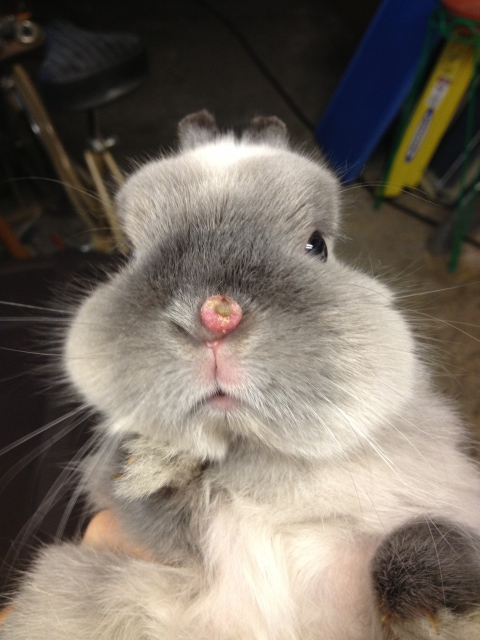 Bump on my rabbits nose
Question
bump on nose bump on nose 2
Breed
Bump on my rabbits nose
Question
bump on nose bump on nose 2
Breed
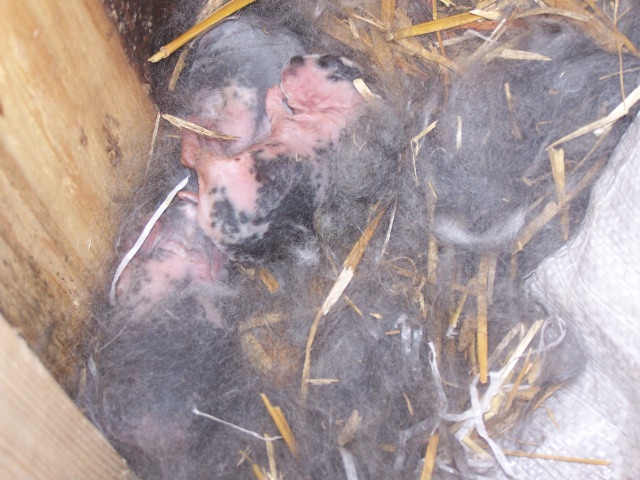 babies
Question
Picture of there nest
My Holland Lop ju
babies
Question
Picture of there nest
My Holland Lop ju
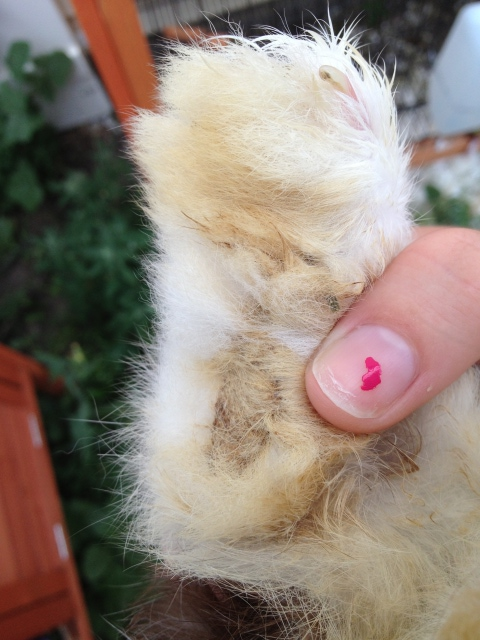 Sore hock HELP!
Question
Foot
Hey guys,
I bought this rabbit in
Sore hock HELP!
Question
Foot
Hey guys,
I bought this rabbit in
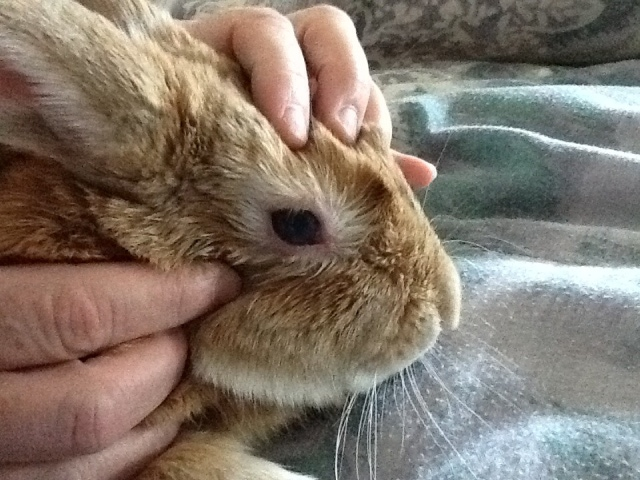 Bunny Eye
Question
Bentleys eye
Our 7 month old bunny Bent
Bunny Eye
Question
Bentleys eye
Our 7 month old bunny Bent